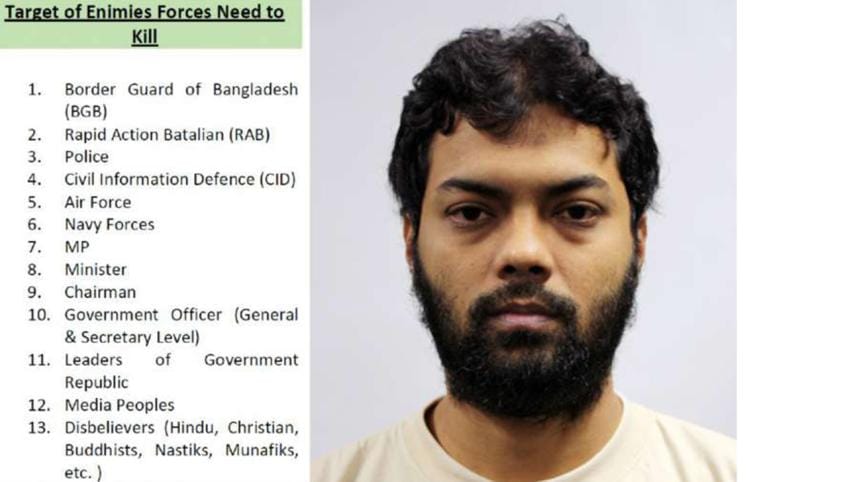Singapore releases kill-list found with Bangladeshis

Members of the so-called Islamic State in Bangladesh (ISB), formed in Singapore in March, had identified several possible targets in Bangladesh, which include lawmakers, ministers, and media personnel, a kill-list released by the country’s home ministry shows.
In a document titled ‘We Need for Jihad Fight’, the group, set-up by Rahman Mizanur, 31, also listed military targets such as the Border Guard of Bangladesh, the Air and Navy Forces, as well as the Rapid Action Battalion (Rab).
Also targeted were police officers as well as "disbelievers".
"The ISB members had intended to join the terrorist group Islamic State in Iraq and Syria (ISIS) as foreign fighters," said the statement.
"However, as they felt that it would be difficult for them to make their way to Syria, they focused their plans instead on returning to Bangladesh to overthrow the democratically-elected government through the use of force, establish an Islamic state in Bangladesh and bring it under ISIS' self-declared caliphate."
ISIS' warped version of Islam has seen the terror group sanction killings of non-Muslims as well as Muslims who disagree with its views in territory it controls, and its influence has spread in countries such as Bangladesh, which has recently seen a spate of deadly attacks on minorities as well as media workers.
Also found on Rahman Mizanur were documents on weapons and bomb-making.
Amongst these was an operating manual for the Accuracy international AX-50 sniper rifle that covers how to fire, strip and maintain the weapon, as well as a bomb-making manual written in Bangla.
Money raised by the group to purchase firearms to carry out their planned terror attacks in Bangladesh has also been seized, said Singapore’s Ministry of Home Affairs.
Also found on the group: "significant amount of ISIS and al-Qaeda radical material" that was used to recruit at least seven other fellow Bangladeshi workers in Singapore, all of whom were detained.
There are some 160,000 Bangladeshi workers here, most of whom are law-abiding and moderate. But a small minority has proven susceptible to the lure of radical ideas.
In a recent report, S Rajaratnam School of International Studies associate research fellow Iftekharul Bashar noted that a segment of the Bangladeshi diaspora has been attracted to global brands of terrorism.
"Online extremist materials in the local language created an open and conducive space for the rapid indoctrination of the diaspora and formation of overseas cells of local groups. Overseas cells are often a key source of funding for local extremist and militant groups in Bangladesh," he added.
Copyright: The Straits Times/ Asia News Network



 For all latest news, follow The Daily Star's Google News channel.
For all latest news, follow The Daily Star's Google News channel.
Comments